#battle of berezina
Text
Józef Poniatowski and Berezina’s crossing
On occasion of the anniversary of the battle of Berezina, which happened 210 years ago, let me tell you a little bit on the topic what was happening with prince Józef at that time.
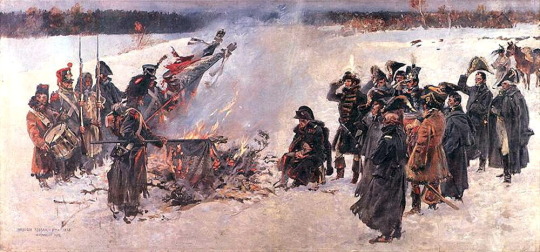
Wojciech Kossak, Burning banners, fragment of "Berezina" panorama
Some paintings, as, for example, the above placed part of Wojciech Kossak’s famous ‘Berezina Panorama’ show prince Poniatowski among Napoleon’s acting military commanders, but this does not reflect the reality. Because...
Well, prince Józef did present among French troops at that time and in that place, but was neither in command of the Polish corps, nor even able to stand.
To explain, however, the reason of such circumstances, we need to go back, for a month and 500 kilometers eastwards. Because there, near a town called Gzhatsk, on the 29th of October there had happened an accident with prince Józef.
Generał Poniatowski, as one of his adjutants, Józef Szumlanśki (more about him I wrote here), recalled, in a desire “to have a better look, spurred his huge English horse to jump onto an adjacent hill. The latter, unfortunately, turned to be rather steep, so the horse did not take the measure right and fell together with its rider...” Prince Józef thus was pinned down by his own horse, and for viewers, the incident looked so terrifying that they believed that Poniatowski had been killed in it!
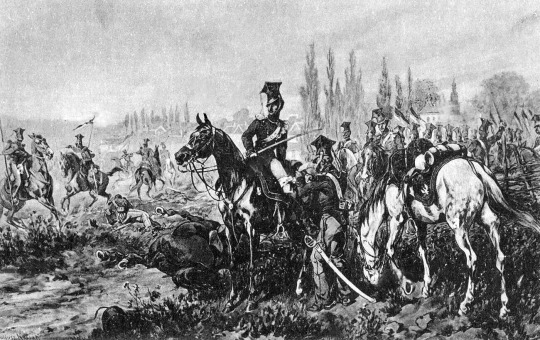
A French engraving, showing prince Poniatowski and the polish lancers during the Russians campaign in 1812
I haven't been able to find any image depicting such a frightening event as described above, so as an illustration to it let me put one with prince Józef riding horse and a one lying near.
And regarding prince Józef’s state after such an incident - well, in fact, as you all know, it didn’t kill him, but its consequences were severe ones. It took a lot of time for doctors to stop bleeding, with the high probability Poniatowski had got brain concussion (though such a diagnosis had not been made that time), and, what’s more essential, prince Józef leg had been dislocated.
A man with such a trauma, of course, wasn’t able to ride a horse and thus general Poniatowski had to hand command of the Polish corps to general Zajączek. The only mean of transportation left to prince Józef in such condition as his was a carriage. And the only road - to the west, together with the rest of Napoleon’s troops.
Initially, Poniatowski’s carriage was riding together with the Polish corps, but by arriving to Berezina had been moved, for greater safety, to the group of vehicles of the imperial guard, who were to cross the river much earlier than the Poles. (This circumstance is a rather important one, being it otherwise - prince Józef’s destiny might have been different...)
And thus we’ve come to Berezina, or - more precisely, to its crossing by the Grand Armée.
I won’t write about the battle itself, neither about the courage of the French pontooners - these brave deeds are out of this post’s topic - but what I ought to mention are throngs of people in queues to cross the river and difficulty of getting even into these queues.
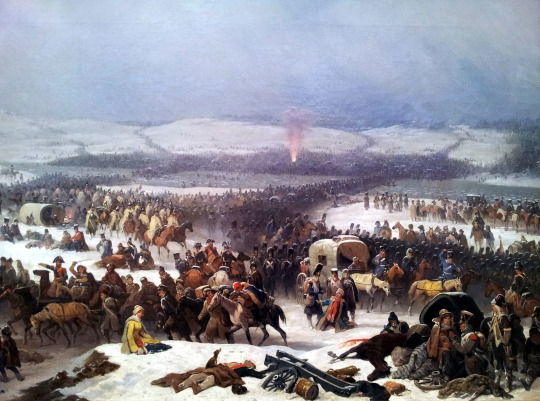
January Suchodolski, Napoleon's troops crossing the Berezina River
Being not on horseback, prince Józef had to wait his carriage’s turn. In the evening of the 27th of November it still had a three quarters of the mile to the nearest bridge, and the chances of being left on Berezina’s eastern side (and thus being eventually captured by Russians) were increasing with with every hour of waiting.
And then colonel Szumlański, the adjutant of Poniatowski I’ve mentioned above, came up with a tricky idea. As he later recalled: I found a detachment of the Guard's gendarmes who, partly at my most urgent requests, partly with generous pay, came to my aid. Shouting "by order of the Emperor”, they...” made all the vehicles standing in the line before prince Józef to have made him way, pushing aside or capsized those who couldn’t have done it by themselves. “By half past three in the morning this operation was successfully completed.”

Maria Artwińska, The White Lady of the Poniatowski family over prince Józef’s carriage near Berezina
As the final illustration of the post let me place a drawing by the Polish painter Maria Artwińska, who depicted prince Józef’s carriage together with... a ghost. The latter is the notorious White Lady of the Poniatowski family, which allegedly appeared before them at crucial moment of their lives'. Prince Józef is said to see the ghost thrice, first time at Berezina, then during the May night in Kraków, when making a final decision to stay with Napoleon, and finally - in the battle of Leipzig, shortly before his death.
#Poniatowski#józef poniatowski#battle of berezina#1812#józef poniatowski's last year#napoleon#berezina#wojciech kossak#january suchodolski#maria artwińska#the white lady of the poniatowskis
47 notes
·
View notes
Text
Proper cavalry charge music.
Six-minute downloadable version here. If you have headphones or speakers with great bass, the reverb on this extended mix is *chef's kiss*.
#SoundCloud#im comtemplating the battle of Berezina again#and crying#am currently stuck in a waiting room#is trying to write#music
0 notes
Text
Ida meets Ney in Russia
I dimly remember that somebody (Cadmus?) mentioned they wanted to read more from Ida. So here’s a brief snippet of Ida – for once – getting in trouble with her hero, of Ney scolding her and … being jealous of Eugène?
The meeting takes place somewhen in late 1812 or early 1813, as much as it’s possible to tell from Ida’s chronological rollercoaster ride. In any case, after or at the end of the Russian retreat. Because of course Ida had joined the Russian campaign as well.
And not only she. If any tumblerinas here plan on learning how to time travel and want to go back to see the Grande Armée march towards Moscow, they don’t need to worry about incognitos. Most likely they would barely be noticed, as apparently there were wagonloads of groupies following their heroes around.
Okay: four. But that’s only those ladies Ida travelled with. Plus, two of them died on the way back.
Ida was particularly fond of a Polish-Lithuanian girl named Nidia, as madly in love with general Montbrun as Ida was in love with Ney. Not that either of the two got to see their idol much during the march. As a matter of fact, the first thing Nidia learned before entering Moscow was that Montbrun had been killed at the battle of Borodino. Other than that, Ida claims to have had a bad feeling about this city from the start:
As we entered Moscow, occupied at last by our troops, this immense city seemed to us like a vast tomb; its empty streets, deserted buildings and solemnity of destruction were heartbreaking. Despite the pomp of victory, I felt struck by I don't know what new kind of melancholy when I saw it; the flags seemed to me gloomy and almost surrounded by funeral crêpes and black forebodings. We were staying in Rue Saint-Pétersbourg, near the Miomonoff palace, which was soon occupied by Prince Eugène. The sight of this young hero and the cheers of the soldiers, who adored him, gave us back all the illusions of victory.
Okay, so I just added this because it’s so rare to see Eugène receive some praise. (I should also mention that the adored young hero was growing bald at an alarming rate and that his bad teeth were killing him.)
As a matter of fact, Ida claims that Nidia was especially interested in Eugène because he was rumoured to maybe become king of Poland (yes, another candidate). These rumours did really exist, Eugène mentions them in a letter to his wife before the campaign started. (And he also makes it pretty clear that these are just rumours and that he has not the slightest ambition to stay in this country. He may have used different vocabulary than Lannes but he didn’t like the region any better.)
The following night, Ida and Nidia wake up to a burning Moscow and are saved by soldiers of 4th corps. On the retreat, they seem to have followed headquarters as closely as possible, which was their safest bet to stay alive (because where the emperor is, there’s food and firewood and a resemblance of order) but still witness horrible tragedies. After the crossing of the Berezina, they apparently followed the remnants of Eugène’s 4th corps to Marienwerder, before Nidia says goodbye and goes back to defending Poland.
But before, on the way, at Valutina (?), Ida finally sees Ney again
At this point, after the retreat, Ida at least starts to question her decision to follow the Grande Armée around. Or something like that.
I have just recounted my fatigue, my difficulties and my perils in a war beyond human endurance, because of the new aspects it seemed to give to destruction and death. A powerful feeling made me undertake everything and endure everything. Why was I going to face the hazards of a campaign? Why was I going to expose the weakness of a woman to the rigours of a climate of iron? In order to obtain yet another glance from the one whose smile had always paid me for my military errands. This look was always like a world offered to my hopes; the dream alone of this reward had made possible all the impossibilities of time, distance, sex and fortune. My life was thus burnt for a few hours, still uncertain. I was giving up everything for a moment in space. Alas! this time, how I was going to regret this moment that had cost me so much to conquer! I had just gambled my existence for a flash of happiness, and this flash, the quickest of my life, became the cruelest.
I had to spend three fatal hours in a miserable shack on the outskirts of Volutina. My dress was so horrible that it was a real disguise. In a person dressed like that, one could hardly suspect a woman. Ney, however, only had to look my way to recognise me. To have been seen was enough to have been discovered. I was about to rush to the front of this first happiness; I was about to testify to the soul of my life how proud I was of this divination of friendship, of this perspicacity of memory, when words of an energy which was far from that of the feeling of which I was possessed, intimated to me the order of the most positive dismissal:
"What are you doing here? What do you want? Go away quickly."
With this address and a few short, curt rebukes about my reckless rage and my fury at following him everywhere, I only had the strength to reply: "It is a rage, indeed, but it is not at least the rage of pleasure or vanity," pointing to my coarse clothes and my face burnt by the sun and faded by fatigue. He took no notice of either the harangue or the costume. He was off and running. His displeasure at seeing me there was so great; he let it out so vividly that I thought he was going to push me back to the opposite bank of the Dniéper in his anger. Stunned by the reception, struck by lightning, I remained motionless for more than an hour, staring at him, thinking I saw him; he had disappeared without paying any more attention to me or worrying about me.
From which we can deduct that Ney was not a reader of Jane Austen novels. Otherwise he would have known that whenever you have behaved in a way that made a woman fall in love with you that’s f-ing your fault, monsieur!
In 1813, when I recalled to Marshal Ney this scene of such violent fury, followed by such cruel silence and abandonment, he told me that he had been so mortally frightened by the extravagance which had pushed me into the midst of so many perils and the licentiousness of an army, that he had even been tempted to beat me. Truth requires me to admit that the temptation had been so strong that he had, I believe, yielded to it a little; it was without his knowing it, for the great passions know neither all they want nor all they do. Anger is therefore still love, since it is as blind as fury.
Girl, get help. Seriously.
When we crossed the Dniéper at Serokodia, I could have had another word with him. A new laurel had just hidden his wrongs and healed my wound. I could have, I wanted to say to him: You have just added to your immortal glory here; you alone have just saved Frenchmen lost in deserts of ice; I would have liked to express to him what all parties repeat today, what posterity will proclaim on the ashes of the brave... But I stuck to the joy of hearing the distant cheers. There was then a little fear in my delirium for him, and I almost have the idea that I idolised him even more by fearing him in that way…
Did I mention the thing about getting help?
Yes, even the reproach was appreciated by my heart, and still seemed to me a tender interest. I found I don't know what pleasure in hearing myself scolded later for my association with Nidia, my marches and counter-marches with the Viceroy's troops. No matter how many times I told the Marshal that Eugène's protection had been focused exclusively on the young Lithuanian girl, and that I had slipped unnoticed into this benevolence, he took it into his head to believe nothing of these sincere protestations. To make him reconsider such a strongly conceived idea would have meant exposing myself to a repeat of the Dniéper order and military correction. I had no intention of trying the same pleasure twice. Finally, he saw the evidence of my attachment, and he found the generosity to prove this belated but strong conviction to me [...]
By calling her his brother-in-arms, by the way. And this, I believe, really meant a lot to Ida.
#napoleon's marshals#michel ney#ida saint-elme#memoirs#napoleon's family#eugene de beauharnais#russian retreat#russian campaign#russia 1812#also#we have a phone call by a certain vice-queen interested in the exact definition of the word “protection” in this particular context
43 notes
·
View notes
Text
The Battle of the Berezina on 29 November 1812 by Peter von Hess

The Battle of (the) Berezina (or Beresina) took place from 26 to 29 November 1812, between Napoleon's Grande Armée and the Imperial Russian Army under Field Marshal Wittgenstein and Admiral Chichagov. Napoleon was retreating back toward Poland in chaos after the aborted occupation of Moscow and trying to cross the Berezina River at Borisov. The outcome of the battle was inconclusive as, despite heavy losses, Napoleon managed to cross the river and continue his retreat with the surviving remnants of his army.
The immediate result of the Battle of Berezina had been simple: the French retreat went on, the Russian Army followed. Although it had been a Russian tactical victory by definition as the losses of the "defeated" outweighed those of the "victor", the victorious Russian force failed to meet its original objectives. Indeed, despite enormous losses, Napoleon was in a position to claim a strategic victory, having snatched what was left of his army from a seemingly unavoidable catastrophe. There would be no large military confrontation for the rest of the retreat, although the incessant harassment of Russian Cossacks and the weather continued to take a toll on the surviving members of the French army.
The losses had been extraordinary. It is estimated that 20–30,000 French combatants became casualties. "To the number of the slain in action must be added probably as many as 30,000 non-combatants." The Guard, which had not come into action at all, lost about 1,500 men out of 3,500. Much, however, had been saved. Napoleon, his generals, 200 guns, the war chest, much of the baggage, and thousands of officers and veteran soldiers had escaped. Overall, approximately 40,000 members of Napoleon's army were saved. Without this core of experienced men, Napoleon could not have rebuilt his armies for the battles of the War of the Sixth Coalition.
According to author Andrew Zamoyski: The next two days were, according to some, among the worst of the entire retreat[...]no fallen horse or cattle remained uneaten, no dog, no cat, no carrion, nor indeed, the corpses of those who died of cold and hunger.
Napoleon left his army on 5 December at Vilna. The temperatures dropped to -33.75 °C on 8 December and the number of combatants was down to 4,300. On 14 December the rest of the French main army crossed the Niemen. 36,000 French prisoners of the Grande Armée were taken by the Cossacks between 1–14 December. The only troops that had remained were the flanking forces (43,000 under Schwarzenberg, 23,000 under Macdonald), about 1,000 men of the Guard and about 40,000 stragglers. No more than 110,000 were all that was left from 612,000 (including reinforcements) that had entered Russia. The Russian losses may be about 250,000 men. Louise Fusil, a French actress, who was living in Russia for six years, returned with the army and offers details in her memoires. In French historiography, Berezina is later associated with disaster.
Sources. French invasion of Russia, The Battle of the Berezina, from Wikipedia, the free encyclopedia
youtube
#Отечественная война 1812 года#War of 1812#Художник#Начинающий художник#famous artists#Эрмитаж#Hermitage Museum#Russian Empire#Российская империя#История России#Наполеон#Napoleon Bonaparte#Наполеоновские войны#Михаил Кутузов#Mikhail Kutuzov#Peter von Hess#theintexp#Youtube
4 notes
·
View notes
Text
Berezina
Jail for 1000 years for 9th Cinebook for moving the logo on the last book

Berezina 3 is the comic for you if you want Naps in a fuzzy coat
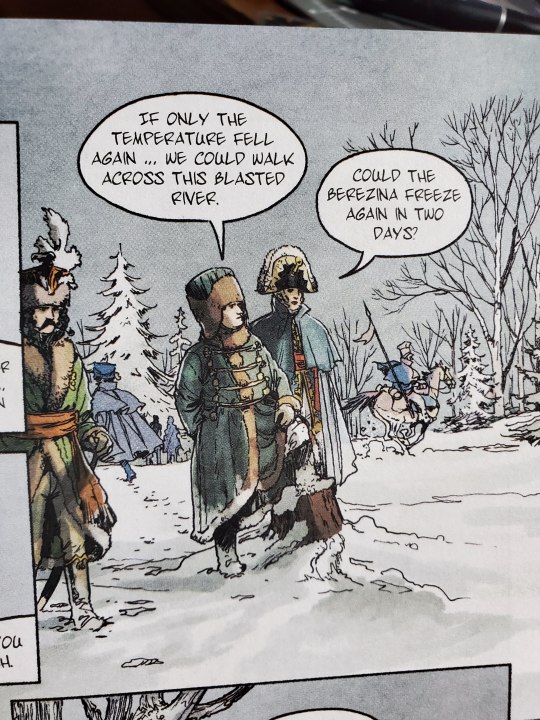
The Berezina trilogy sticks the landing better than The Battle did.
Though "everything sucked and it was kinda pointless" is a easier note to end on than "I wanna write Lejeune having a rebound romance, I wanna add an assassination conspiracy, and let's get ready for more war"
37 notes
·
View notes
Text
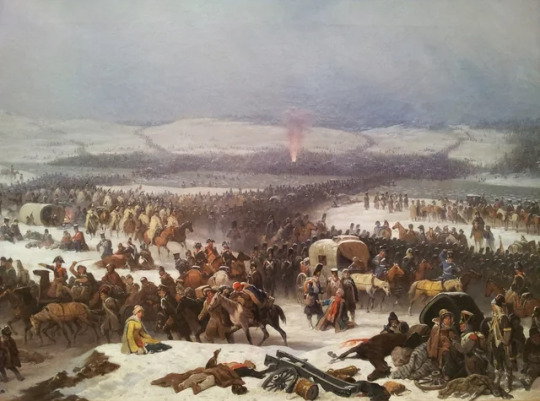
The Battle of the Berezina River, by January Suchodolski, 1866.
2 notes
·
View notes
Text
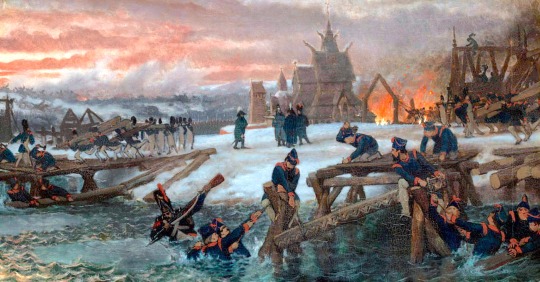

The Crossing of the River Berizina - 1812. By Lawrence Alma-Tadema
Dutch engineers at the Battle of Berezina. Only 40 out of 400 survived.
#romanticism#history#painting#art#sir lawrence alma tadema#berezina#russia#napoleonic wars#dutch#french#napoléon#bonaparte#europe#european#netherlands#holland#napoléon bonaparte
26 notes
·
View notes
Text
Events 11.26 (before 1950)
783 – The Asturian queen Adosinda is held at a monastery to prevent her nephew from retaking the throne from Mauregatus.
1161 – Battle of Caishi: A Song dynasty fleet fights a naval engagement with Jin dynasty ships on the Yangtze river during the Jin–Song Wars.
1476 – Vlad the Impaler defeats Basarab Laiota with the help of Stephen the Great and Stephen V Báthory and becomes the ruler of Wallachia for the third time.
1778 – In the Hawaiian Islands, Captain James Cook becomes the first European to visit Maui.
1789 – A national Thanksgiving Day is observed in the United States as proclaimed by President George Washington at the request of Congress.
1805 – Official opening of Thomas Telford's Pontcysyllte Aqueduct.
1812 – The Battle of Berezina begins during Napoleon's retreat from Russia.
1852 – An earthquake as high as magnitude 8.8 rocks the Banda Sea, triggering a tsunami and killing at least 60 in the Dutch East Indies.
1863 – United States President Abraham Lincoln proclaims November 26 as a national Thanksgiving Day, to be celebrated annually on the final Thursday of November. Following the Franksgiving controversy from 1939 to 1941, it has been observed on the fourth Thursday in 1942 and subsequent years.
1865 – Battle of Papudo: A Spanish navy schooner is defeated by a Chilean corvette north of Valparaíso, Chile.
1914 – HMS Bulwark is destroyed by a large internal explosion with the loss of 741 men near Sheerness.
1917 – The Manchester Guardian publishes the 1916 secret Sykes-Picot Agreement between the United Kingdom and France.
1917 – The National Hockey League is formed, with the Montreal Canadiens, Montreal Wanderers, Ottawa Senators, Quebec Bulldogs, and Toronto Arenas as its first teams.
1918 – The Montenegrin Podgorica Assembly votes for a "union of the people", declaring assimilation into the Kingdom of Serbia.
1920 – Ukrainian War of Independence: The Red Army launches a surprise attack against the Makhnovshchina.
1922 – Howard Carter and Lord Carnarvon become the first people to enter the tomb of Pharaoh Tutankhamun in over 3000 years.
1922 – The Toll of the Sea debuts as the first general release film to use two-tone Technicolor. (The Gulf Between was the first film to do so, but it was not widely distributed.)
1924 – The Mongolian People's Republic is officially established after a new constitution, passed by the first State Great Khural, abolishes the monarchy.
1939 – Shelling of Mainila: The Soviet Army orchestrates an incident which is used to justify the start of the Winter War with Finland four days later.
1941 – World War II: The Hull note is given to the Japanese ambassador, demanding that Japan withdraw from China and French Indochina, in return for which the United States would lift economic sanctions. On the same day, Japan's 1st Air Fleet departs Hitokappu Bay for Hawaii.
1942 – World War II: Yugoslav Partisans convene the first meeting of the Anti-Fascist Council for the National Liberation of Yugoslavia at Bihać in northwestern Bosnia.
1942 – Casablanca, the movie starring Humphrey Bogart and Ingrid Bergman, premieres in New York City.
1943 – World War II: HMT Rohna is sunk by the Luftwaffe in an air attack in the Mediterranean north of Béjaïa, Algeria.
1944 – World War II: A German V-2 rocket hits a Woolworth's shop in New Cross, London, killing 168 people.
1944 – World War II: Germany begins V-1 and V-2 attacks on Antwerp, Belgium.
1949 – The Constituent Assembly of India adopts the constitution presented by Dr. B. R. Ambedkar.
0 notes
Text
Iron wars ct flether

#IRON WARS CT FLETHER SERIES#
The Sharpest Fight: The 95th Rifles at Tarbes, 20th March 1814. Fletcher, Ian Younghusband, Tony (1997).Waterloo: A Near Run Thing (Reissued 2003 ed.). The Battle of Borodino: napoleon versus Kutuzov.
#IRON WARS CT FLETHER SERIES#
Jim Schlossnagle recaps a supers sweep as A&M heads to the heartland Texas A&M is headed to the College World Series in Jim Schlossnagles first year guiding the Fightin Texas Aggies. The Battle of the Berezina: Napoleon's Great Escape. On Monday morning, the head baseball coach joined TexAgs Radio to recap the Aggies sweep of Louisville and share his excitement to be going to Omaha. Tactics and the Experience of Battle in the Age of Napoleon. Great Generals of the Napoleonic Wars and their Battles 1805–1815. The Rise and Fall of Napoleon Bonaparte: Volume I – The Rise. The Rise and Fall of Napoleon Bonaparte: Volume II – The Fall. Citizen Emperor: Napoleon in Power 1799–1815. Napoleon Against Himself: A Psychobiography. Fletcher IRON WARS is the most hardcore POWER LIFTING competition in the US today Going on five years IWV is.Ĭharlottesville, VA: Pitchstone Publishing. Six, Georges (1934) Dictionnaire biographique des généraux et amiraux français de la Révolution et de l'Empire: 1792-1814.Paris, Librairie Historique et Nobiliare. With Eagles to Glory: Napoleon and his German Allies in the 1809 Campaign. Russia Against Napoleon: The True Story of the Campaigns of War and Peace. 1812: Napoleon’s Fatal March on Moscow: Napoleon's Fatal March on Moscow. Wellington's Regiments: The Men and their Battles 1808–1815.

0 notes
Text
Steel Division 2 - PC Game Trainer Cheat PlayFix No-CD No-DVD | GameCopyWorld

💾 ►►► DOWNLOAD FILE 🔥🔥🔥
Welcome to the page dedicated to the cheats of Steel Division 2. Without further delay let's introduce this article to you! If you know about new cheats, we would be happy to know them. Contact us! You will also help other users who are looking for them. Steel Division 2 is a strategy game in real time of the Second World War, historically accurate game set on the eastern front. Features 1: the management of the army to shifts on the scale of 1, and tactical battles in real time with thousands of men to your order. We have cheats valid for PC. The list of consoles is continuously updated from PC , the date on which Steel Division 2 was published. For this game we also have the promo trainer! A trainer is a software that allows you to unlock a lot of cheats. At the bottom of the page you will also find a list of unlockable achievements in this game with a small guide. Cheats: Steam Achievements. Accomplish the following tasks to obtain the corresponding Steam Achievement:. Trainers for Steel Division 2 are small, downloadable programs that add functionalities to the game, mainly with the aim of cheating. These functionalities are not available in other ways. Click on the preferred trainer to download it:. Tom Clancy's The Division 2: Cheats and cheat codes. Steel Division: Normandy Cheats and cheat codes. Latest sheats and sheat sodes added. Wyvern: Cheats and cheat codes. Conquer and Breed the Demon Queen: Cheats and cheat codes. Boss of this gym: Cheats and cheat codes. Game Master Engine: Cheats and cheat codes. Space Gladiators: Cheats and cheat codes. Circuit Superstars: Cheats and cheat codes. Dungeon No Dungeon: Cheats and cheat codes. Big Bia: Cheats and cheat codes. The Tenants - Free Trial: Cheats and cheat codes. Including cheats for Steel Division 2. We have one of the biggest databases of Cheats in the world. With a little help from my friends Add one friend Add one friend. Reach the level 5 Reach the level 5. Win a multiplayer game in Conquest mode Win a multiplayer game in Conquest mode. Win a game with each faction in skirmish mode Win a game with each faction in skirmish mode. Win a 2v2 multiplayer game Win a 2v2 multiplayer game. Win a 3v3 multiplayer game Win a 3v3 multiplayer game. Engagez-vous, rengagez-vous Party Animal Party Animal. Win a 10v10 multiplayer game Win a 10v10 multiplayer game. Win a 4v4 multiplayer game Win a 4v4 multiplayer game. Bobr, Berezina, Niemen Desperate resistance Desperate resistance. Order No. Highway to Hell Highway to Hell. Battle-Hardened Battle-Hardened. Reach the level 10 Reach the level Not a step back! Win the Orscha strategic campaign with the Germans Win the Orscha strategic campaign with the Germans. Win the Bobruisk strategic campaign with the Germans Win the Bobruisk strategic campaign with the Germans. Win the Baranovichi strategic campaign with the Germans Win the Baranovichi strategic campaign with the Germans. Berezina, fateful waters Win the Berezina strategic campaign with the Germans Win the Berezina strategic campaign with the Germans. Trapping the fascists! Win the Bobruisk strategic campaign with the Soviets Win the Bobruisk strategic campaign with the Soviets. Desperate assault Desperate assault. Last train for glory Last train for glory. Stairway to Heaven Stairway to Heaven. Same place, different enemy Win the Berezina strategic campaign with the Soviets Win the Berezina strategic campaign with the Soviets. Win the Orscha strategic campaign with the Soviets Win the Orscha strategic campaign with the Soviets. Win the Baranovichi strategic campaign with the Soviets Win the Baranovichi strategic campaign with the Soviets. Reach the level 20 Reach the level
1 note
·
View note
Text

general winter on his way to put napoleon to shame, 1812, colorized.
#dont @ at me ok#nct#nct 127#nct u#memes#history memes#jaehyun#jung jaehyun#russia#france#battle of berezina
39 notes
·
View notes
Photo

From the Berezina Panorama by Wojciech Kossak
#wojciech kossak#polish art#napoleonic wars#battle of berezina#art history#19th century#original post
26 notes
·
View notes
Photo

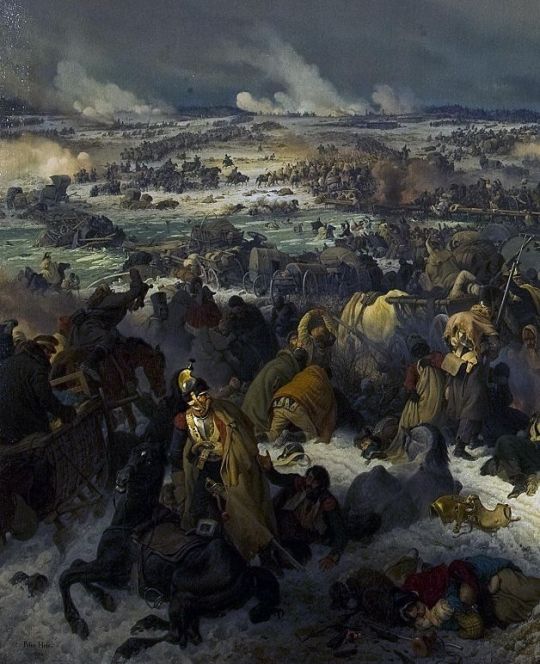
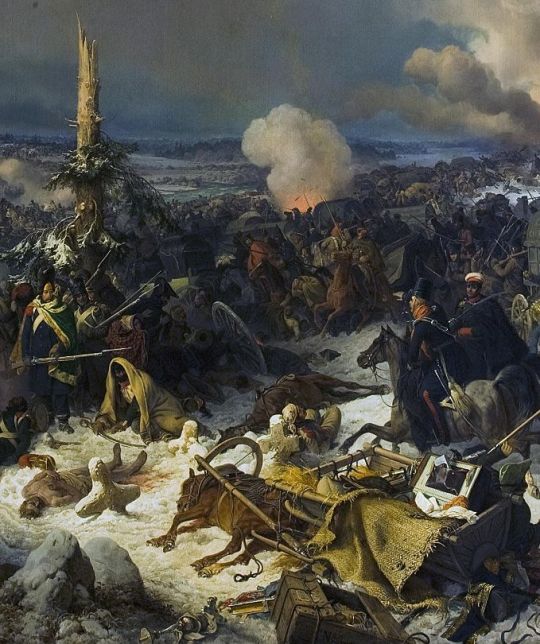

Crossing the Berezina River, 29 November 1812, painted by Peter Hess
The painting is a part of the series devoted to the great battles of the Patriotic War of 1812. On the morning of 17 (29) November 1812 Russian troops took the village of Studyanki (near the place where the Frenchmen had crossed the Berezina), and the vanguard of General Piotr Wittgenstein marched to the bank of the river. On the right there is Wittgenstein (on a bay); nearby there are Russian Cossacks and infantrymen making their way amid abandoned French carts; there are also the Bashkirs and the Kalmyks who comprise the irregular Cavalry of the Russian Army. In the centre are two Russian officers offering surrender to a group of French soldiers. On the left are French soldiers. In the foreground, next to the cart, on the snow there is a Marshal's uniform, Legion of Honour ribbon, box from which church values are pouring out. In the background there are burning bridges across the Berezina River. On the right the village of Studyanki is burning; nearby the Russian artillery is firing at the enemy located on the right bank of the river.
Text by the Russian State Hermitage Museum
148 notes
·
View notes
Text

"The fight is over"
Artwork by Elena Berezina (sharandula)
#sail under the black#pirate#pirates#piracy#sea#ocean#fight#battle#sword#sword fight#elena berezina#sharandula
41 notes
·
View notes
Text
The Second Battle of Polotsk on 19 October 1812 by Peter von Hess

The Second Battle of Polotsk (18–20 October 1812) took place during Napoleon's invasion of Russia. In this encounter the Russians under General Peter Wittgenstein attacked and defeated a Franco-Bavarian force under Laurent Gouvion Saint-Cyr. In the aftermath of this success, the Russians took Polotsk and dismantled Napoleon's operations in Belarus. Wittgenstein's victory set the stage for the Battle of Berezina in November, in which three Russian armies converged on Napoleon from separate directions.
While advancing on Moscow, Napoleon left a contingent of French and German troops at Polotsk to guard his northern flank against Wittgenstein. The French defensive bastion at Polotsk, alternately commanded by St. Cyr and Oudinot and located about 200 miles (320 km) east of the Polish border and about 150 miles (240 km) northwest of Smolensk, was extremely important to Napoleon for several reasons.
By establishing a firm front at Polotsk, Napoleon kept Wittgenstein's command at bay. It was critical to French interests that Wittgenstein not be allowed to march south, because such an advance by the Russians would lead to Napoleon's Grande Armée, hundreds of miles to the east, being exposed to an attack in its rear while it was engaging the main Russian army near Moscow.
On the first day of combat, the Russians made seven consecutive frontal assaults on Polotsk, while Steingal's force began advancing on the French rear. The fighting at Polotsk was torrid and bloody, with the Russians losing close 8,000 to 12,000 troops, and the French suffering about 8,000 casualties. All seven Russian attacks were beaten back by the end of the day. St. Cyr could claim to have won round one in this bitter battle, but the affair was not over. Planning to renew his attack once Steingal's forces arrived, Wittgenstein maintained a heavy artillery bombardment of Polotsk, and before long much of the town was consumed by fire.
Late on the next day, 19 October, Steingal advanced to within four miles (6 km) of Polotsk, and St. Cyr realized he was threatened with encirclement. That night, knowing that their position was untenable, the French began evacuating Polotsk. Fierce house-to-house combat ensued in the town as the Russians launched their final attack.
Acting decisively to secure his battered forces' southern retreat route, St. Cyr ordered his Bavarian contingent to drive Steingal back early the following day, 20 October. This task was accomplished by the Bavarians impressively, as Steingal was compelled to retreat with heavy casualties. The French thus saved themselves from encirclement by the Russians, but still, the battle for Polotsk had been lost.
After three days of combat, St. Cyr's forces had been reduced to no more than 15,000 weary troops, in full retreat before Wittgenstein's 38,000 Russians. Two weeks later, Wittgenstein's troops captured the French supply depot at Vitebsk, inflicting a logistical disaster on Napoleon's fast collapsing Russian operation. Napoleon's northern front—the "Dwina Line"—was broken, and the consequences for Napoleon's Russian invasion were grim.
Sources. The Second Battle of Polotsk, from Wikipedia, the free encyclopedia
youtube
#Отечественная война 1812 года#War of 1812#Художник#Начинающий художник#famous artists#Эрмитаж#Hermitage Museum#Russian Empire#Российская империя#История России#Наполеон#Napoleon Bonaparte#Наполеоновские войны#Михаил Кутузов#Mikhail Kutuzov#Peter von Hess#theintexp#Youtube
2 notes
·
View notes
Text


I got my copy of Berezina 1. I got my mixed feelings about the writer due to The Battle, but this set of 3 has Murat and I'm hopelessly thirsty for Napoleonic graphic novels.
Also I have said it before and I will say it again. Why the everloving hell is there such a long delay between the UK and US release dates (April 30 for the UK and June 30 for the US). IT'S ALREADY IN ENGLISH FOR GOD'S SAKE.
81 notes
·
View notes